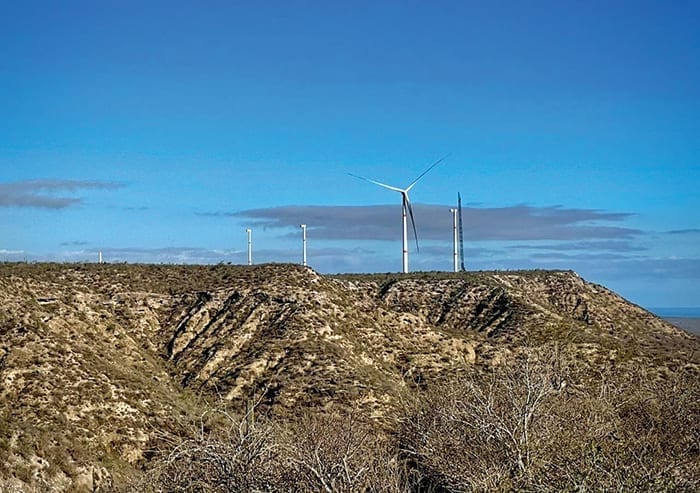Mexico reformed its energy market in 2013, opening the country’s energy sector to private investment. It created opportunities for foreign companies to bring their expertise to Mexico, particularly in the renewable energy sector, a trend continuing today despite challenges to foreign investment from the country’s current government, and a more recent effort that could deal another serious blow to renewable energy projects.
The country’s first three clean energy auctions, held in 2016 and 2017, were considered successful, as major solar and wind developers, including EDF and Enel Green Power from Europe, SunPower from the U.S., and JinkoSolar from China, came into the market and drove electricity prices down. That changed when Andrés Manuel López Obrador—known by his acronym, AMLO—took over as Mexico’s president in December 2018. His government, considered a center-left nationalist group, immediately moved to undo market liberalization measures carried out by the previous government of Enrique Peña Nieto. AMLO’s administration has focused on supporting state-owned utility Comisión Federal de Electricidad (CFE); among the president’s actions was canceling a fourth clean energy auction within days after his election. That has slowed renewable energy growth in Mexico, particularly as the AMLO administration leveled charges of corruption against developers of renewable energy projects and threatened legal action.
The most recent move, a bill introduced in the nation’s Congress in February, aims to change the order in which electricity is dispatched into the national grid. It would send projects from private investors to the back of the line, behind power dispatched by CFE. Renewable energy currently is dispatched first because it is the country’s cheapest electricity, but the bill—expected to pass, as the current government has a majority in both houses—would prioritize CFE’s power. Carlos Ramirez, a consultant at Integralia, told Mexico News Daily: “It’s open war. It’s a sign the government is becoming more radical.”
Analysts have said the bill threatens as much as $41 billion in private-sector investments in electricity generation in Mexico, and could bring lawsuits, with experts—including the U.S. Chamber of Commerce—saying it could run afoul of the U.S.-Mexico-Canada (USMCA) free-trade agreement. López Obrador, a vocal supporter of fossil fuels, has said his country’s energy laws have left the CFE “in ruins,” noting the utility lost $3 billion in the first nine months of 2020.
Mexico has set a target of receiving 35% of its power from clean energy sources by 2024, but is expected to fall short of that goal, particularly if regulations against foreign investments become more onerous. Some renewable energy projects continue to move forward, though; the country’s energy ministry in January said Mexico’s renewable energy power capacity increased by 13.4% during the first 10 months of 2020, as more solar and wind plants were installed and began testing.
 |
|
1. Wärtsilä has been contracted to provide an energy storage system for the 50-MW Eolica Coromuel, S. de R. L (ECO) wind farm in La Paz, Mexico. The Wärtsilä energy storage system, known as GridSolv Max, is designed to deliver a power output of 10 MW for the operational life of the project. Courtesy: Wärtsilä |
New projects are being approved; Wärtsilä in February announced it has been contracted to provide what it calls a “project-critical” energy storage system for the 50-MW Eolica Coromuel, S. de R. L (ECO) wind farm in La Paz, Mexico (Figure 1). The Wärtsilä energy storage system, known as GridSolv Max, is designed to deliver a power output of 10 MW for the operational life of the project. Wärtsilä also is providing a long-term service agreement that includes maintenance, remote monitoring, and performance guarantees.
The ECO wind farm is owned by San Diego, California-based Eurus Energy America Corp., a subsidiary of Tokyo, Japan-based global renewable energy company Toyota Tsusho Corp., which is the parent of Eurus Energy Group, Japan’s largest renewable energy developer. The wind farm, along with the Wärtsilä energy storage system, will be connected to the local grid controlled by the National Center for Energy Control (CENACE), Mexico’s independent system operator.
“This project will help Mexico meet its renewable energy goals, and efficient energy storage is a key element for its success,” said Nick Henriksen, vice president of Eurus Energy America, in comments provided to POWER. John Robbins, business development manager for Wärtsilä Energy, said, “Enabling a transition towards a 100 percent renewable energy future is central to Wärtsilä’s strategy, so we are delighted to be supporting this project with our advanced energy storage solution. We have demonstrated our ability to meet ECO’s schedule and technical requirements, which are backed by commercial guarantees.”
The Wärtsilä system can control the facility’s ramp rate, in order to enhance generation reliability, as well as providing frequency control and capacity. Wärtsilä’s GEMS smart energy management system will interface with and take instructions from the wind farm master controller. According to Wärtsilä, “GEMS is a platform that connects energy assets to energy markets in a technically and economically optimized manner. The platform’s flexible architecture—adjusting based on market conditions—and real-time optimization, supports the management of fluctuations in output caused by dynamically changing wind conditions.”
How many more projects such as Wärtsilä’s, or other renewable energy installations, take shape could depend on what happens with the new bill in Mexico’s Congress, and the outcome of expected legal actions. Neil Herrington, senior vice president of the Americas for the U.S. Chamber of Commerce, in a statement on Feb. 5 said the bill could lead to reinstatement of government monopoly on energy in Mexico.
“These changes would significantly raise the cost of electricity and limit access to clean energy for Mexico’s citizens,” Herrington said in a statement. “Unfortunately, this move is the latest in a pattern of troubling decisions taken by the Government of Mexico that have undermined the confidence of foreign investors in the country.”
—Darrell Proctor is associate editor for POWER (@POWERmagazine).










